Virtual Console: N64 Most Wanted
I remember when it was all Hyrule field around here.
The mid-nineties was an exciting time to be a gamer. It was back then that a whole new generation of game fans came into being thanks to Sony's canny engagement of the mass-market with the PlayStation, and a time when the heroes of the medium for the next ten years made their presence felt - Lara Croft, Solid Snake, the Final Fantasy series, and many others. For those who had played games for many years before, though, it was also a time when you could almost feel history being made with successive game releases, as 3D hardware finally reached the point where it could start to replace 2D as the mainstay of gaming.
It was an experimental, fascinating time - and while the PlayStation may have been the victor in terms of sales and long-term impact, it would be wrong to underestimate the contribution of the Nintendo 64 to the advances of the time. Not only the headline games - like Mario 64, which basically defined how 3D platformers would work, and Zelda: Ocarina of Time, which reinvented the action RPG genre - but a large number of less celebrated titles which also did their part to push the medium forwards.
That's why we're excited about the potential for revisiting some of those classics on the Virtual Console. Despite the quality of some of the software available, the N64 never really captured the hearts of most gamers - and the high price of cartridge-based software meant that few people ever got to play more than a handful of top titles. With Virtual Console, we have a chance to explore the N64 library properly. Right now, though, the only game you can download is Mario 64 - so here's our look at the games we really want to see on Virtual Console over the coming months and years...
10. Space Station Silicon Valley
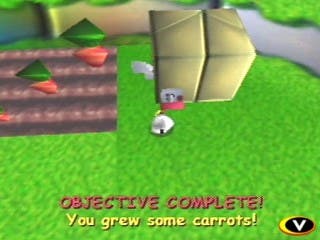
- Developer: DMA Design;
- Publisher: Take 2
The premise of Space Station Silicon Valley was as silly as the name - an orbiting zoo and amusement park is sucked into a timewarp, and when it comes out a thousand years later, the animals on board have merged with the technology of the station to create weird hybrids. The player - in the role of a computer chip which is all that remains of a heroic robot - must take control of the animals to solve puzzles, defeat enemies, and save the world from the imminent crash of the station into the Earth.
Ridiculous? Beautifully so. Developed by DMA Design before the heady days of Grand Theft Auto 3 turned it into Rockstar North, Space Station Silicon Valley was one of the finest puzzle / adventure games of the era. It simply brimmed with creativity - each bizarre animal had its own unique skills, and a combination of skills would often be required to solve each puzzle and progress through the wonderfully designed levels. On the downside, the game exhibited a number of show-stopping bugs and had a nasty tendency to crash, which would hopefully be fixed in any Virtual Console release - but it remains one of our favourite and one of the funniest games on the platform.
9. Blast Corps
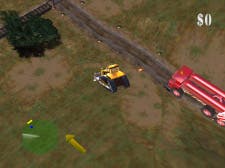
- Developer: Rare;
- Publisher: Nintendo
The first Rare game on this list, and far from the last. Blast Corps is a game that has been crying out for a sequel since its release in 1997, but even now the original game is a huge amount of fun. The concept is simple: a pair of nuclear missiles are being moved to a safe site to be detonated, but they start to leak so they have to take the fastest path possible to get there. You play a demolition agent who must create a level path for the missiles; one jolt and the missile carrier could explode, which would be rubbish not only because it would herald a nuclear winter and wipe out humanity, but also because then you'd have to restart the level.
Of course, it's not quite as simple as rolling around in a bulldozer - you'll also have access to a load of other vehicles, including giant humanoid mechs, and on some levels you'll have to fill holes, build bridges or even use TNT crates to get rid of particularly pesky buildings. All the time, of course, there's the impending time limit of the carrier marching onwards towards its goal, bearing its lethal, level-restarting cargo. It's brilliant fun, all told, and a fine marker for the kind of quality Rare was turning out at the time - more of which you'll be seeing elsewhere on this list.
8. Jet Force Gemini
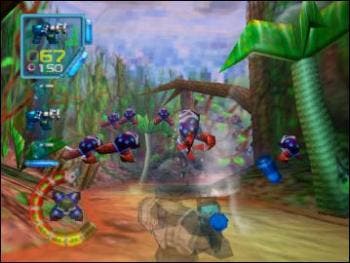
- Developer: Rare;
- Publisher: Nintendo
Speaking of which... Jet Force Gemini was one of Rare's last games on the N64, and also one of its best. Although it never garnered the sort of acclaim or success that the firm's really big titles did, it was an extremely slick and well made third-person shooter which borrowed heavily from both platform games and first-person shooters - both genres in which the developer had more then proved itself down the years. Heavily anime-influenced visuals and character designs set the perfect tone for a game in which you controlled one of the twins June and Vela, or their heavily armoured "wardog" Lupus, on a mission to stop the plans of an evil space insect overlord.
The single-player game featured lush visuals (for the time), a preponderance of fun weapons to try out and a number of really nice environments - and also had an interesting co-op option which allowed a second player to control a droid (called Floyd) who followed the main player's character around blasting enemies and generally being useful. Solid multiplayer modes completed the package - besides which, who can really say no to a game where the chief protagonist is called King Jeff? Not good enough for you? He has a lost brother called Prince Barry. Brilliant.
7. Mario Kart 64
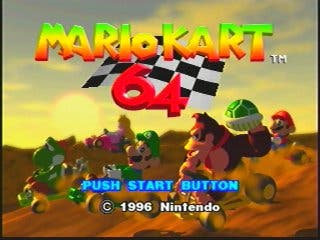
- Developer: Nintendo;
- Publisher: Nintendo
The first properly 3D version of Mario Kart was met with skepticism in some quarters - indeed, there can be few game series whose occasional updates inspire quite so much impassioned debate among fans, so it's probably not surprising that such a major overhaul had a mixed reaction. However, many insist that MK64 was a real high point for the series, and the basics of how it worked have been carried forward not only into Mario Kart Double Dash on the Cube and Mario Kart DS, but also into a host of me-too kart racing games on other platforms.
You all know how Mario Kart works at this stage, of course - and Mario Kart 64 defined much of that gameplay, and remains arguably the single purest example of it. 16 stages (plus their mirrored versions) make up a game with a nearly perfect difficulty curve, downright superb multiplayer, a battle mode which was actually fun (in contrast to the mixed offerings in later iterations) and a carefully considered line-up of weaponry. Incredibly accessible and yet very tricky to master, it remains a high point for the series and yet another example of Nintendo's pitch-perfect adaptations of SNES favourites to the powerful 3D capabilities of the N64.
6. Perfect Dark
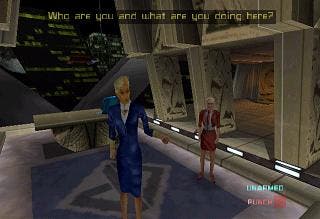
- Developer: Rare;
- Publisher: Nintendo
There's a reason why people were so excited by the prospect of Perfect Dark Zero on the Xbox 360 - and so disappointed by how it eventually turned out - and it's this game. The spiritual successor to the incredibly popular GoldenEye 007, Perfect Dark introduced Joanna Dark's part-cyberpunk, part-sci-fi adventures to the world, and with it created one of the best console FPS games ever made - while also, almost unintentionally, opening many people's eyes to the potential of stealth as a tool in action-focused first-person shooters.
Despite the title, though, the game wasn't perfect in every way - most notably, Rare tried to push the N64 too hard and ended up with a very dodgy frame-rate in places, not to mention the occasional ugly graphics glitch. However, players were mostly happy to forgive such faults in return for a game which may not have quite reached the dizzy heights achieved by GoldenEye, but nevertheless improved on its predecessor in key areas such as AI and lighting effects, and featured a set of multiplayer options so comprehensive as to be almost ridiculous.
5. Legend of Zelda: Majora's Mask
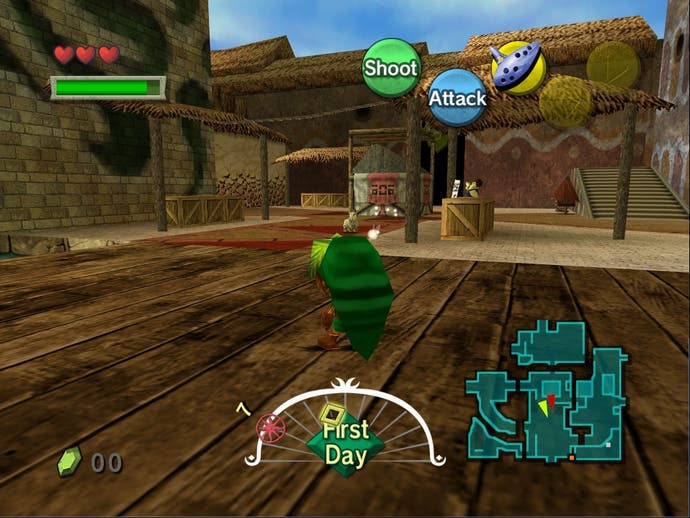
- Developer: Nintendo;
- Publisher: Nintendo
After Ocarina of Time changed everyone's perceptions of how a Zelda adventure should work - indeed, how the entire action RPG genre should work - there was no doubt that people wanted more. It's to Nintendo's credit, then, that the company didn't simply deliver a second helping of almost exactly the same thing - because while Majora's Mask is based on the same basic interactions which were used in Ocarina, the game couldn't be more different from its predecessor in many other ways.
This is perhaps the darkest and most melancholy of the Zelda games; even the fractured and discordant twilight world of Twilight Princess doesn't match up to the sense of oppression which pervades the world of Majora's Mask, with the disquieting and twisted visage of the huge moon bearing down on the town, and the desperately lonely Link fighting to save it. It's beautiful, evocative and sad - words which aren't applied lightly to any game. Perhaps less accessible than Ocarina of Time, certainly, but nonetheless a game which deserves its place as a standout title in the Zelda canon.
4. Sin and Punishment
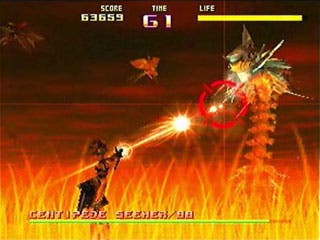
- Developer: Treasure;
- Publisher: Nintendo
The only game on this list which didn't get a European (or even a US) release, Sin and Punishment basically turned up too late in the day for it to be a viable prospect in the west. Even in Japan, the game was only produced in limited numbers - which makes this into one of the most sought-after games of the time, right up there with Radiant Silvergun, another Treasure title which is considered one of the finest shoot-'em-ups ever made and now fetches vast sums on eBay.
Sin and Punishment rightly deserves its place as a sought-after cult classic; while at heart it's a simple enough on-rails shooter which gives the player control over aiming, firing, and dodging rather than allowing them full third-person control of a character, it's also a genuinely excellent example of Treasure's design geniuses at the height of their abilities. Glorious artwork and perfectly pitched gameplay make this into a game which we'd love to see gaining a wider audience through Virtual Console - making up, as it were, for the sin of never localising it in the first place.
3. Paper Mario
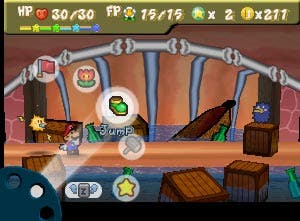
- Developer: Intelligent Systems;
- Publisher: Nintendo
The mere mention of Mario is enough to set eyes rolling in some quarters, and results in frequent bizarre claims that Nintendo fails to innovate or make creative strides because it relies too heavily on its main character franchise. This couldn't be further from the truth - if anything, Nintendo uses Mario to allow it to innovate, by attaching a well-known character to a new game concept as a badge of quality - and Paper Mario is a game which demonstrates this as ably as any other.
In essence, this is an RPG; the plot (Bowser kidnaps Peach!) is straightforward, and the graphics rely on 2D artwork over cel-shaded 3D backgrounds, which give the whole game the same visual flavour as previous Mario titles. The gameplay, however, is ingenious - combining traditional Mario platform elements with a simplified and yet utterly compelling turn-based RPG system, and bringing the various weird characters in the Mario universe to life to an extent never seen before. Coming out at the tail end of the N64's life, it passed many gamers by - but out of all the N64 titles, it has aged the least graphically, and its gameplay remains fresh and interesting to this day.
2. GoldenEye 007
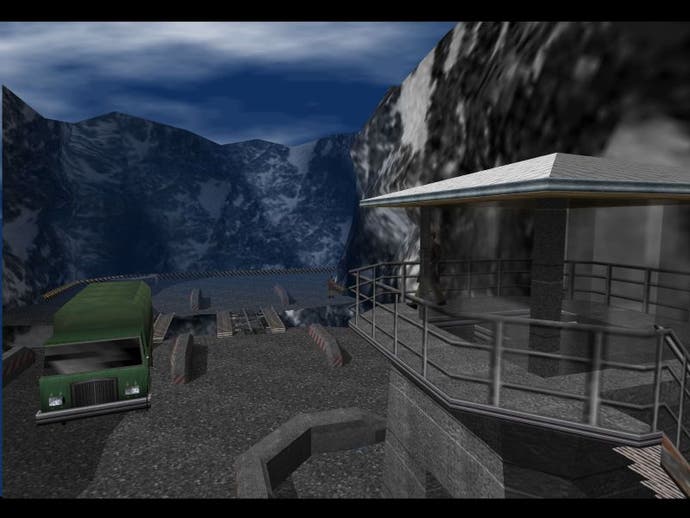
- Developer: Rare;
- Publisher: Nintendo
In the world of movie licensed games, GoldenEye still stands head and shoulders over the competition - and until relatively recently, it still had a strong claim for the title of best console FPS game ever. Taking the source material of the movie, the team at Rare successfully turned it into a series of incredibly tightly designed, interesting and varied levels, each more memorable than the last - and then topped it off with a multiplayer mode which wasn't matched in console FPS games until Halo came along years down the line.
Atmospheric, intelligent and filled with weapons which simply feel right, GoldenEye was filled with things which even PC games of the time - despite being the natural home of FPS titles - didn't manage. Levels had multiple routes through them, and multiple objectives to be fulfilled, and there was even a rudimentary stealth element, which Rare later expanded upon in Perfect Dark. The influence of the game can be felt in almost every FPS game since - and playing GoldenEye now, while graphically crude, remains a truly compelling experience.
1. Legend of Zelda: Ocarina of Time
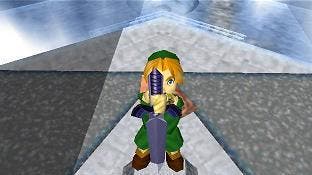
- Developer: Nintendo;
- Publisher: Nintendo
It's been reissued in various forms, but Ocarina of Time remains the obvious choice as our number one most wanted N64 game on Virtual Console. The epic tale of Link's journey through the Hyrule of both the present and the future was ground-breaking when it appeared, providing possibly the most stunning reworking of a SNES-era franchise into 3D that we've ever seen and laying the foundations for the entire 3D action RPG genre for years afterwards. Beautiful graphics showed off the potential of the N64 like no other game, while fantastic music, excellent combat and superbly designed dungeons set a high water mark for quality of game design that few have reached in the years since.
Looking back at it now, it's no longer groundbreaking, of course - many games we've played in the intervening years have had Ocarina of Time's mechanics built in. However, just like reading Lord of the Rings is still a wonderful experience for many people despite the now-ubiquitous nature of orcs, elves and the likes, so too Ocarina of Time is still a wonderful game despite the commonplace copying of its innovations. It's clever, emotive and atmospheric, and Link remains an intriguing character who is uniquely sympathetic and likeable despite his mute nature. Zelda has always been one of Nintendo's top franchises - with this game, every positive word written about the series was justified, and over six years later it remains a stirring example of the power and potential of the videogaming medium.








